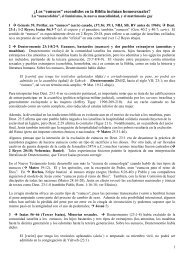Deuteronomy: - Fundación Otras Ovejas de Argentina
Deuteronomy: - Fundación Otras Ovejas de Argentina
Deuteronomy: - Fundación Otras Ovejas de Argentina
Create successful ePaper yourself
Turn your PDF publications into a flip-book with our unique Google optimized e-Paper software.
1.10.16 From marriageable age onwards, the right to marry and start a family. Deut. 21:10-14; 25:5-10;<br />
5:18; 15:12-15 (cf. Ex. 21:2-4); 22:22; 23:1.<br />
1.10.17 The right to possess property. Deut. 5:19, 21; 19:14 // 27:17; 22:1-4; 24:6.<br />
1.10.18 The right to free thinking, to free conscience and to religion. Deut. 14:21; 29:9-14, slaves.<br />
1.10.22 The right to social security. Deut. 14:27,28-29; 15:1-6,7-11,12-18; 23:25-26; 24:10-13,19,20-22.<br />
1.10.23 The right to work, to choose one‘s work freely... to protection against unemployment.... to equal<br />
pay for equal work.... to an equitable and satisfactory remuneration. Deut. 24:14-15.<br />
1.10.24 To rest and to the enjoyment of free time, to a reasonable limit to the duration of work, and to<br />
periodic, paid vacation. Deut. 5:14; 16:1-17, festivities.<br />
1.10.25 The right to social protection. The el<strong>de</strong>rly, Deut. 5:16; immigrants, 10:19; the poor, 15:4,7-11;<br />
slaves, orphans and widows, 16:11,14; Levites, 18:1-8; animals, 22:4.<br />
1.10.26 The right to education. Deut. 6:6-8, of children by parents; 33:10, adults by the Levites.<br />
1.10.27 The right to freely take part in the cultural life of the community, to enjoy the arts and to<br />
participate in scientific progress and its resulting benefits. Deut. 5:14; 16:1-17, festivities; 4:5-6, ―wisdom‖; 32:1-<br />
43, ―Song of Moses‖.<br />
1.10.28 The right to a social or<strong>de</strong>r in which rights and liberties...become fully effective. Deut 4:8.<br />
1.10.29 Every person has responsibilities to one‘s community, since it is only within that community that<br />
one can freely and fully <strong>de</strong>velop one‘s personality. Deut. 6:20-25.<br />
Rights with no apparent parallel in <strong>Deuteronomy</strong>:<br />
— 9 No person can be arbitrarily <strong>de</strong>tained, ma<strong>de</strong> prisoner or banished. (Deut.?)<br />
— 15 Every person has a right to a nationality. (Deut.?)<br />
— 19-21 Freedom of expression, peaceful assembly, <strong>de</strong>mocratic political participation (Deut.?)<br />
Although Georg Braulik(1994), from whose work the above is adapted, is correct in pointing out that almost all 30<br />
human ―rights‖ have forerunners in <strong>Deuteronomy</strong>, the concept of “rights” (including its implicit linguistic and<br />
i<strong>de</strong>ological prejudice against left-han<strong>de</strong>d persons and against ―Leftist‖ i<strong>de</strong>ologies, � Judges) is totally absent in<br />
<strong>Deuteronomy</strong>. It refers more concretely to liberation/liberty, justice, loving solidarity and wisdom, but never to<br />
―rights‖. Charles Taber 30 points out that our specific concept of ―rights‖ is relatively mo<strong>de</strong>rn, stemming from the<br />
Enlightenment, John Locke (1632-1704), Jean-Jacques Rousseau (1712-78), the American (1776) and French<br />
revolutions (Déclaration <strong>de</strong>s droits <strong>de</strong> l‟homme et du citoyen, 1789), with similar legal provisions realized<br />
gradually in England during the course of the 19th century. 31 But Taber also conclu<strong>de</strong>s that three important,<br />
regrettable distortions emerged in the mo<strong>de</strong>rn concept of human ―rights‖:<br />
� The extreme individualism prevalent in our Western historical context resulted in applying ―rights‖ to<br />
individual, isolated people, or even in opposition to the interests of other individuals. Taber refers to postmo<strong>de</strong>rn<br />
philosophy and to the judicial courts which are overwhelmed by the number of cases. He points out that non-<br />
Western societies would not say ―I think, and therefore I exist‖ (Descartes), but, rather, ―I belong (to a certain<br />
family or community), and therefore I exist‖—an attitu<strong>de</strong> and a frame of mind that are closer to the mentality and<br />
sensibility of the Bible, particularly that of <strong>Deuteronomy</strong>.<br />
12

















